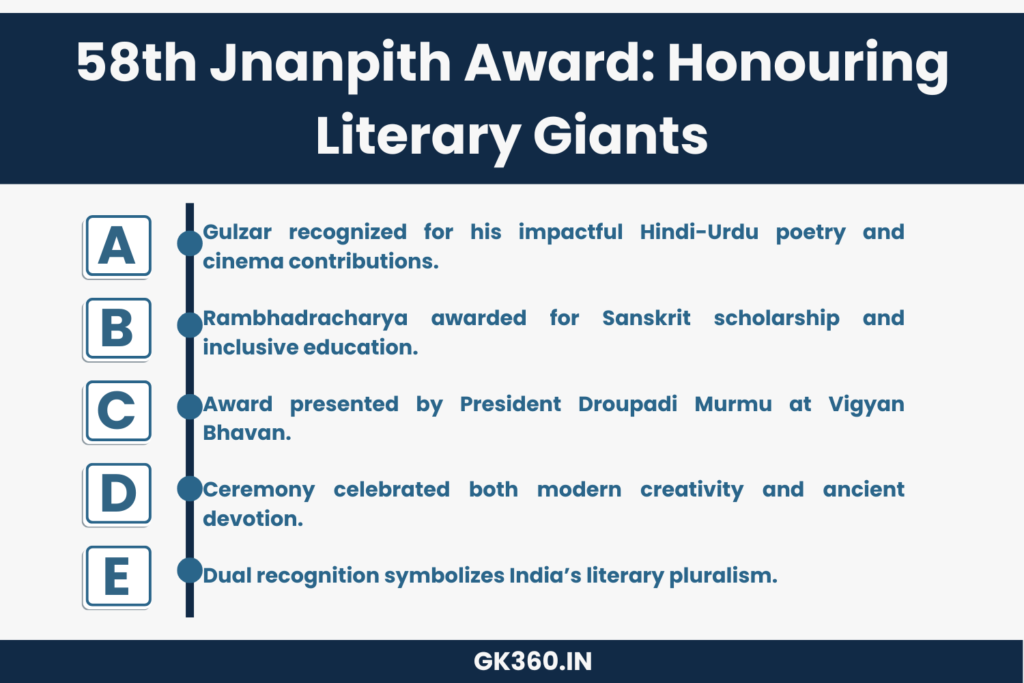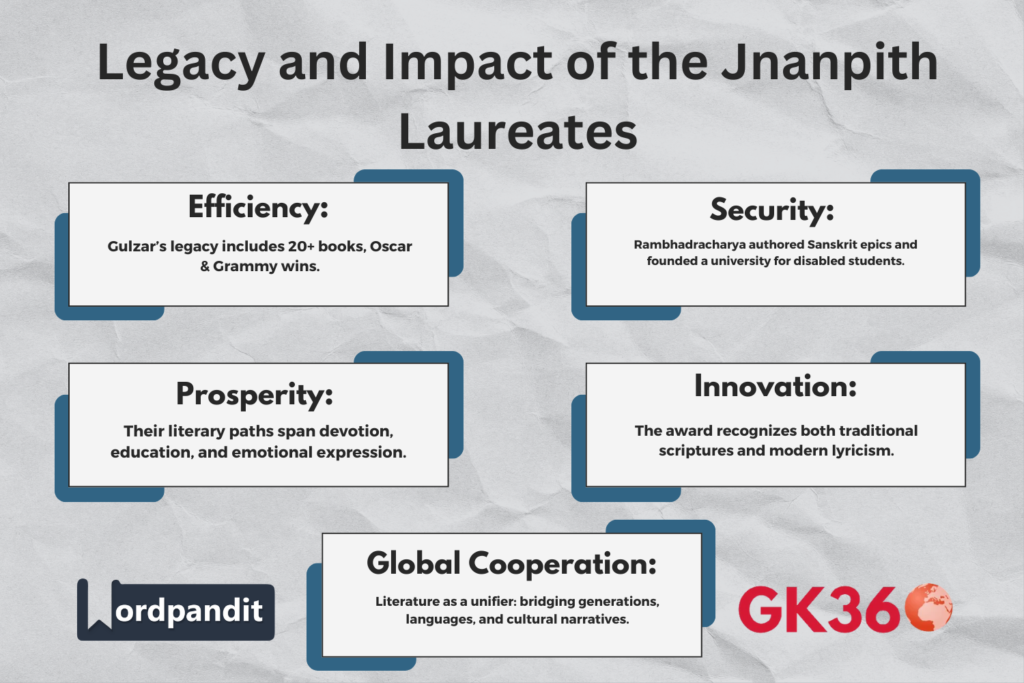Jnanpith Award 2025: Gulzar and Rambhadracharya Honoured for Their Literary Excellence
Introduction: Honouring India’s Literary Icons
In a historic celebration of India’s literary spirit, the 58th Jnanpith Award — the nation’s highest literary honour — was conferred upon two iconic figures: Gulzar, the master of cinematic poetry, and Jagadguru Rambhadracharya, a revered Sanskrit scholar and spiritual leader. The awards were presented by President Droupadi Murmu on May 17, 2025, in a grand ceremony at Vigyan Bhavan, New Delhi.
This year’s dual recognition reflects the inclusive and diverse soul of Indian literature — one shaped by ancient devotion and modern emotional storytelling. While Gulzar’s lyrics and screenwriting have stirred the hearts of millions, Rambhadracharya’s monumental contributions to Sanskrit and inclusive education have elevated the nation’s cultural legacy.

Table of Contents
- Introduction: Honouring India’s Literary Icons
- What is the Jnanpith Award?
- Who is Jagadguru Rambhadracharya?
- Who is Gulzar?
- Highlights from the 58th Jnanpith Ceremony
- Why This Recognition Matters
- Cultural and National Significance
- FAQs: Jnanpith Award 2025
- Conclusion: Celebrating India’s Literary Legacy
What is the Jnanpith Award?
The Jnanpith Award, instituted in 1961 by the Bharatiya Jnanpith, is the highest literary recognition in India, presented annually to authors for outstanding contributions to Indian literature across any of the official languages listed in the Eighth Schedule of the Constitution.
Award Components:
- A citation
- A cash prize
- A bronze statue of Vagdevi (Saraswati) — the goddess of wisdom
Over the decades, this prestigious honour has celebrated literary icons such as Amrita Pritam, Girish Karnad, and Mahadevi Verma, reinforcing the award’s role in nurturing India’s intellectual and cultural traditions.
Who is Jagadguru Rambhadracharya?
A saint, scholar, and educator — Swami Rambhadracharya, also known as Jagadguru Ramanandacharya, is a towering figure in the world of Sanskrit and Hindi literature.
Early Life and Challenges
Blind since infancy, Rambhadracharya’s prodigious memory and spiritual commitment set him on an extraordinary path. By the age of five, he had already memorised sacred epics like the Bhagavad Gita and Ramcharitmanas.
Literary Contributions
He has authored over four Sanskrit epics, including the widely acclaimed Geet Ramayan and Dashavatara Charitam — works revered for their literary beauty and philosophical depth.
Educational Impact
In 2001, he founded the Jagadguru Rambhadracharya Divyang State University (JRDSU) in Chitrakoot — the first university of its kind dedicated to students with visual and physical disabilities, now serving over 2,000 students.
His life is a testament to how knowledge, faith, and resilience can transform limitations into legacies.
Who is Gulzar?
Sampooran Singh Kalra, known by his pen name Gulzar, is a literary craftsman whose work has redefined modern Indian poetry and cinema.
Literary & Cinematic Brilliance
Gulzar’s evocative lyrics and poetic finesse are evident in classics like:
- Tujhse Naraz Nahi Zindagi
- Chaiyya Chaiyya
- Humko Mann Ki Shakti Dena
His extensive body of work includes over 20 books, countless film scripts, and some of the most soul-stirring songs in Indian cinema.
Prestigious Accolades
Gulzar’s excellence has been acknowledged through global recognitions:
- Oscar Award
- Grammy Award
- Dadasaheb Phalke Award
Though unable to attend the ceremony due to health reasons, Gulzar’s legacy was passionately honoured at the event — a tribute that transcended his physical absence.
Highlights from the 58th Jnanpith Ceremony
Held at the prestigious Vigyan Bhavan in New Delhi, the ceremony was attended by distinguished scholars, political dignitaries, and cultural icons. President Murmu, in her address, emphasized the unifying power of literature and its role in fostering national identity and cultural pride.
Why This Recognition Matters
The joint conferral of the 58th Jnanpith Award to Gulzar and Rambhadracharya underscores the pluralistic and inclusive spirit of Indian literature. It celebrates two vastly different — yet equally profound — literary journeys:
- One rooted in devotional scholarship, preserving and enriching India’s ancient scriptural traditions.
- The other expressive of modern emotionality, painting the human experience through the lens of cinema and contemporary verse.
This dual recognition not only bridges generational and linguistic divides, but also highlights literature’s power to shape thought, build empathy, and unify diverse cultural narratives.
Cultural and National Significance
Literary Diversity in Focus
By honouring figures from Sanskrit and Hindi/Urdu traditions, the award ceremony spotlighted the rich linguistic tapestry of India — reinforcing how heritage and modernity coexist within the nation’s literary identity.
Presidential Endorsement of Literary Unity
In her keynote address, President Droupadi Murmu emphasized the role of literature in building cultural unity, fostering intellectual discourse, and shaping national identity. The presence of esteemed literary figures alongside policymakers served as a powerful visual of literature’s role in governance and society.
Role Models for Future Generations
Both Gulzar and Rambhadracharya serve as inspirational figures for youth — whether it be in pursuing poetic expression or overcoming physical challenges to become global change-makers.

FAQs:
- What is the Jnanpith Award?
It is India’s highest literary honour, awarded annually by Bharatiya Jnanpith to authors for outstanding contributions to Indian literature in any of the official Indian languages. - Why were Gulzar and Rambhadracharya selected for the 58th Jnanpith Award?
Gulzar was selected for his profound impact on Hindi and Urdu literature, especially through cinema and poetry. Rambhadracharya was honoured for his Sanskrit epics, spiritual teachings, and educational work for the differently-abled. - When and where was the award ceremony held?
The awards were presented on May 17, 2025, at Vigyan Bhavan in New Delhi. - What does the Jnanpith Award include?
Winners receive a citation, a bronze idol of Vagdevi (Saraswati), and a cash prize. - What is the cultural relevance of the Jnanpith Award?
It is a symbol of literary excellence and plays a pivotal role in promoting language diversity, cultural unity, and national pride through the recognition of exceptional literary talent.
Conclusion:
The 58th Jnanpith Award Ceremony was more than an awards function — it was a cultural milestone, reinforcing literature’s timeless role in shaping thought, fostering unity, and elevating national consciousness.
Both Gulzar’s poetic journey and Rambhadracharya’s spiritual scholarship stand as reminders that literature transcends language, disability, or medium. It flows — as verse, as scripture, as song — into the soul of the nation.
Key Takeaways Table
| Aspect | Details |
| Award Title | 58th Jnanpith Award 2025 |
| Recipients | Gulzar (Hindi-Urdu poetry & cinema), Jagadguru Rambhadracharya (Sanskrit scholarship) |
| Presented By | President Droupadi Murmu |
| Significance | Celebrates diversity: modern poetic expression and devotional Sanskrit tradition |
| Notable Contributions | Gulzar: Film lyrics, screenwriting, global awards; Rambhadracharya: Sanskrit epics, inclusive education |
| Cultural Impact | Strengthens national unity, showcases linguistic richness, and inspires new generations |





